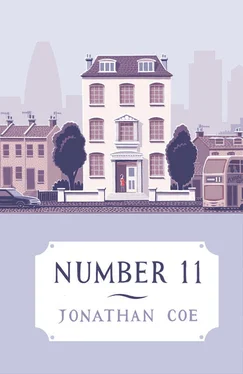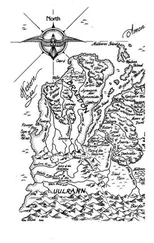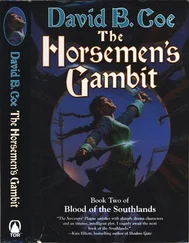Other houses here are even emptier. They contain no furniture, no curtains at the windows, no pictures on the walls. They are always dark. In the winter, when I come back from the park or the cemetery to return the last of my dogs to its owner’s house, the silence and darkness of these streets begins to frighten me. It is as if some terrible plague has come to London and everybody has had to leave but nobody has told me. Once I walked back from the park with Jane, through the streets of Chelsea, and she explained to me that people buy these houses now — rich people — and then just let them stand there, watching money attach to them like barnacles to a sunken ship.
‘Think about it,’ she said. ‘A house like this may be worth thirty-five million pounds. Its value appreciates at the rate of ten per cent — three and a half million every year. That’s seventy thousand pounds a week. Ten thousand pounds every day. What else do you have to do, apart from buy it, and then just leave it alone? The people who own this house —’ (she pointed at the white stuccoed mansion opposite us in the street) ‘— are ten thousand pounds richer than when we walked past here this morning.’
I always learn something new, when I talk to Jane. Sometimes what she tells me fills me with a reluctant kind of respect for the people who understand, much better than I do, how to acquire and increase wealth. Other times I think that, just as a certain famous Romanian used to suck the blood from his victims’ necks, now it is money itself that has begun to drain the life out of this great city.
Rachel stood still and rested for a while, hands on hips, listening to the noise of the wind as it rustled the branches of the plum tree. It was one of her favourite sounds in the whole world.
It was quiet here, this breezy September afternoon. The wind rustled the branches even though the branches were laden. It had been a good crop this year. A bumper crop, that was always the expression, wasn’t it? The plums were ripe: their skins powdery and purple-pink. Rachel’s basket was three-quarters full even after ten minutes’ picking.
It had become a ritual now, a family tradition. In the middle of September, she would come to her grandparents’ house in Beverley for a few days, and one afternoon she would take out the old wooden ladder from the garage, and lay it against the sturdiest branch of the tree, and climb up to pick the plums which her grandparents were no longer strong or agile enough to harvest. For the last three years, this had been the prelude to her setting out for Oxford at the beginning of October. But the Oxford days were over now. She had finished her studies, and graduated, and was facing an empty, uncertain future, with a lovely big burden of debt to accompany her. For the last three months she had been living with her mother in Leeds, answering job adverts and sending out CVs. All to no effect, so far, although a couple of private tutorial agencies in London had added her to their books. Something would come up, she was sure. All she could do was to keep trying.
She ate one of the plums, spat the stone out, then took the ladder and leaned it up against a different branch of the tree, facing the house now. This way she could reach some of the topmost fruit. After climbing the ladder, she could also see across the back garden and into her grandparents’ bedroom, where Gran was sitting up on the bed. She had the Telegraph spread out on her lap but she wasn’t reading it. She had her head thrown back and her mouth half open, but she wasn’t asleep either, as Rachel had first thought: after a few seconds she raised herself, drank from the mug of tea on her bedside table and stared tiredly around her. She looked pale and anxious. Grandad had been ill for about a week now, with stomach cramps, vomiting and diarrhoea. They both referred to it as his ‘tummy bug’, and for several days this is what everyone had thought it was, but this morning there had been blood in his stools so Gran and Rachel had phoned the GP and on her advice driven him straight to the hospital. Grandad had been put on a ward without too much delay and this afternoon they were going to do some tests. ‘It’s probably just a really nasty tummy bug,’ Gran kept saying, and Rachel wanted to believe her, wanted to believe there was nothing seriously wrong, but still …
The feeling she had was not strong enough to be called a premonition. It was hardly even strong enough to be called a feeling. But in the rustling of the branches as the wind brushed against them, Rachel thought that she could hear the quietest, most evanescent whisper of something momentous. It was quite different from the way that, eleven years earlier, the death of David Kelly had made her feel. That death had chilled her, even as a young girl. It had seemed not just final, but tragic and unnecessary. Whereas, the message that the wind was trying to bring her — and it wasn’t necessarily about death, she couldn’t allow herself to believe that, just yet — was less shocking, less unforeseen, but somehow even sadder. It had a kind of gentle inevitability about it. It belonged to the same cycle of seasons that brought rich clusters of fruit to this tree at the end of every summer.
The near-silence of the afternoon was broken, at this point, by the muffled shrilling of Rachel’s smartphone as it vibrated in her pocket. Contorting herself carefully on the ladder, she managed to ease the phone out of her pocket and bring it to her ear, noting as she did so that the caller info on the screen said simply ‘Albion’.
‘Hello?’ she said, and a couple of minutes later she was shimmying down the ladder and running back into the house, upstairs to her grandparents’ bedroom, where she woke Gran, who had finally fallen into a doze, and said:
‘Gran, Gran, I’m really sorry to wake you up, but I’m going to have to go. I’ve got a job. I’m going to have to go home and pack.’
‘Oh, lovey, that’s wonderful news,’ said Gran, although she looked more bewildered than happy.
‘I’m really sorry to leave you by yourself.’
‘Oh, don’t worry about that.’
‘Maybe Mum can come and stay with you for a bit.’
‘I’ll be fine. I can look after myself.’
‘Yes, but … waiting to hear from the hospital and everything …’
‘Oh, that’ll be all right. He’s just got a nasty tummy bug. I expect he’ll be coming home tomorrow. Or even tonight.’
‘OK,’ said Rachel, uncertainly. ‘As long as you’re sure.’
‘It’s wonderful that you’ve got a job, after all that waiting. Is it those tutoring people?’
‘That’s right. It’s only for a week, though.’
‘Never mind. It’s a start, isn’t it? It’s bound to lead to something else.’
‘I hope so. I’m just sorry I’m going to be so far away when you’re waiting for Grandad’s results.’
‘Oh, London isn’t far away.’
‘The job isn’t in London. It’s in —’ (and Rachel found herself frowning even as she said it, since even to her it seemed so unlikely, even though Mr Campion had been quite clear about it on the phone) ‘— South Africa.’
As soon as the butler showed her to her tent, Rachel realized that it was not really a tent at all. In fact, the presence of a butler should itself have been a giveaway. The servant, dressed in fez and long white tunic, said nothing to her until they reached the huge canopied space, shaded by jackalberry trees, where a king-size double bed dominated the living area. Even then, he kept his words to a minimum.
‘Toilet,’ he said, opening the door to the toilet.
‘Shower,’ he said, opening the door to the shower.
‘Table,’ he said, pointing to the relevant item, a handsome rosewood dining table at the far end of the decking, commanding a fine view of the swimming pool and the surrounding tents, all of which, at this hour of the day, were empty.
Читать дальше












